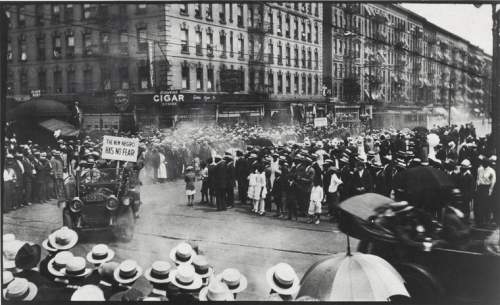
For decades, Harlem was the capital of African-American culture in the United States. Many early songs about Harlem were sensationalist and full of stereotypes. Reefer madness, dangerous men, and even more dangerous women populated the tunes performed by artists both black and white. Their version of Harlem was charged with an air of the exotic.
The neighborhood was seen as a place of ongoing jubilation, even as the Great Depression ravaged its African-American population. It inspired all sorts of musical tributes, from hipster-jive swing songs to extended concert works by James P. Johnson, Benny Carter and Duke Ellington.
A New Black Repertoire
Stride pianist James P. Johnson was one of the great jazz musicians to come out of early 20th century Harlem scene. Johnson was a mentor to the young Fats Waller, and the composer of numerous scores for hit musical shows like Runnin' Wild, which featured his song "The Charleston." From the late 1920s, though, Johnson was primarily interested in writing longer pieces that would fulfill composer Will Marion Cook's vision for a new black concert repertoire built from the music of Jazz Age Harlem. One significant extended work, "Harlem Symphony," was an attempt to paint a musical portrait of Harlem.
Duke Ellington's "A Tone Parallel to Harlem, or The Harlem Suite" is considered to be one of his most successful extended compositions. Artists like Ellington and James P. Johnson appropriated the stereotyped images that were rampant in Harlem entertainment and songs about Harlem, and turned them into something new.
In Portraits of Harlem, I talk with jazz scholar John Howland, author of the recent book Ellington Uptown: Duke Ellington, James P. Johnson, and the Birth of Concert Jazz. Howland discusses the ways in which Ellington and Johnson sought to portray Harlem through long-form musical compositions. The show features many of those tributes, including
- Rare broadcast excerpts of Johnson's Harlem Symphony
- The complete 1963 recording of Ellington's A Tone Parallel to Harlem with the Paris Symphony Orchestra
- The "Sunday Morning" movement of Carter's Harlem Renaissance suite
- Cab Calloway's insinuating "The Man From Harlem"
- Trumpeter Roy Eldridge's elegaic "I Remember Harlem"
Outtakes From The Interview
- A mix of street and high culture
- Harlem Renaissance intellectuals' early reactions to African-American jazz and entertainment music
- Influence of middlebrow radio and the elevation of song form to art music
- James P. Johnson and George Gershwin's efforts to learn classical orchestration
For More About Harlem:
- Listen to music clips from John Howland's Ellington Uptown project.
- Check out the previous Night Lights program Benny Carter: the King at Midpoint to hear Carter's extended piece "Harlem Wednesday."
- View a historical map of Harlem.
- Visit a New York Times interactive exploration of Harlem's Sugar Hill neighborhood.
James P. Johnson archival audio recordings generously provided by the James P. Johnson Foundation of Riverside, CA, and Barry Glover.









